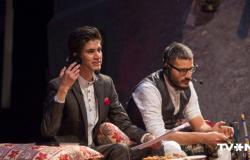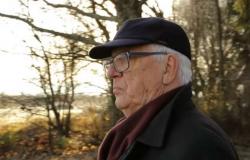Worth seeing, hearing, visiting: Skrastiņš and Ķesteris, Šmits and Kmins, Grava and Dīcis, Žilinskis and Pauliņš, Jurka and Zemītis.
Twists and turns of fame and love in the era of Stalin’s totalitarian regime
Publicity photo
On Thursday, April 4, the historical drama “Marias klusums” directed by Dāvjas Sīmanis, created in the studio “Mistrus Media” in co-production with the Lithuanian film company “Broom Films”, will have its premiere.
It is the true story of the famous actress Maria Leiko and her twists and turns of fame and love during the era of Stalin’s totalitarian regime. The action of the historical drama takes place in 1937.
It tells the story of silent film star Maria Leiko, who returns to the Soviet Union with the birth of her granddaughter.
On his way to Latvia, Leiko stops in Moscow, where he is persuaded to perform in the Latvian theater “Skatuve”. Soon she collides with the brutality of the NKVD – the secret police of the Soviet totalitarian regime brutally kidnaps her granddaughter. What happened to Leiko imposes the most tragic role of her life: she is an innocent victim who is destroyed by the struggle between her own ideals and the bloody regime that surrounds her.
Publicity photo
The film was awarded the Ecumenical Jury Prize at the 74th Berlin International Film Festival.
The film’s creative team: director Dāvis Sīmanis, cinematographer Andrejs Rudzāts, screenwriters Dāvis Sīmanis, Magali Negroni and Tabita Rudzāte, artist Kristīne Jurjāne, make-up artist Beate Ryabovska, composers Paulius Kilbauskas and Justas Štaras, editing director Ieva Veiverīte, executive producer Ilze Krūmiņliepa and producers Gints Grube and Inese Boka-Grube.
In the main roles: Olga Šepicka and Artūrs Skrastiņš (in the title picture), Ćirts Ķesteris, Inese Kučinska, Vilis Daudziņš.

Publicity photo
Marija Leiko was born in Riga on August 14, 1887, and studied at B. Reinas private school for girls, which she graduated in 1903. She later studied at the Vienna Imperial Academy of Music and Dramatic Art, then worked at the New Theater in Frankfurt, the City Theater in Leipzig and the Chamber Theater in Munich. In 1917, she started filming in silent cinema in Germany and worked in M. Reinhart’s acting troupe. Leiko also starred with Friedrich Wilhelm Murnau, a classic of German cinema expressionism. After the Nazis came to power in 1933, she returned to her native Latvia. In 1935, she visited the Soviet Union and stayed in Moscow to temporarily join the troupe of the Latvian State Theater “Skatuve”. As part of the so-called “Latvian operation”, the theater was closed, and on December 15, 1937, Leiko was arrested and accused of participating in the “Latvian nationalist conspiracy”.
On February 3, 1938, at the age of 50, he was shot and buried in a mass grave at the secret mass killing field of the NKVD at the Butov landfill near Moscow.

Publicity photo
“Our film focuses on the final chapter of Marija Leiko’s life, when she unwittingly becomes a witness to the cruel persecution of Latvians organized by Stalin and also its tragic victim. The characters played by Maria Leiko, her unique style and expressive talent as an actress went beyond the boundaries of simple artistic expression. They reflected her political beliefs and avant-garde view of the world, ultimately determining the tragic trajectory of her life,” says Dāvis Sīmanis.
“Having experienced the most progressive and creative stage of the 20th century, starred in films such as Friedrich Wilhelm Murnau’s “Satan” and dazzled the audience on the stage of Ervin Piskator’s German political theater, Maria Leiko was able to imagine an ideal society in which individual rights would be respected, saving the majority of society from a miserable existence. .

Publicity photo
Leiko’s unwavering belief in the transformative power of art in an atmosphere of political repression put him in direct conflict with Stalin’s brutal regime.
As has happened with many in history, she was also among the losers in this battle. And yet, just like millions of other innocent souls, she brings us a deep historical lesson with her fate. Surprisingly, this lesson resonates especially sharply right now, almost a century later, when we put in context the inhuman conflict in Ukraine, Russia’s internal repression and global disputes, and the frightening aggravation of authoritarian tendencies even in some European countries,” says the director of the film.

Publicity photo
Ask your question to the NRA Lifestyle experts by sending it to e-mail: [email protected]











